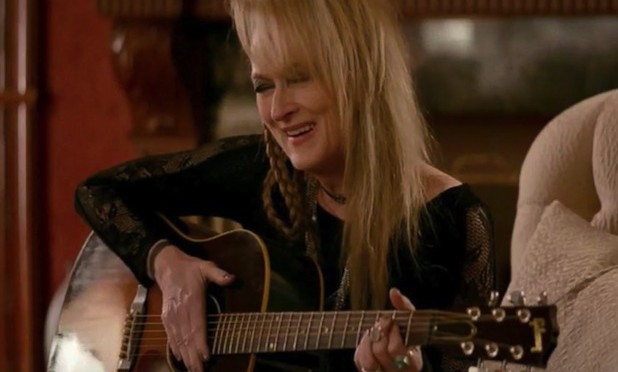Diablo Cody isn’t usually one to fail. With a strong track record of insightful screenplays including Juno, Jennifer’s Body and Young Adult, it’s disappointing to see her talent fall flat in the Jonathan Demme-directed (The Silence of the Lambs, Philadelphia) Ricki and the Flash.
A redemption tale, of sorts, the film tells the story of Linda Brummel (Meryl Streep), who rebrands herself to Ricki Rendazzo after abandoning her family in Indiana in the 80s to head to Los Angeles and attempt becoming a proper rock star. Her plans fall somewhat flat decades later when she’s playing as the house band at a dive bar called The Salt Well in Tarzana. To add to the authenticity of the fading/aging rocker aura, Rick Springfield plays her bandmate and boyfriend, Greg.
Even though Ricki’s success is mediocre, she appears contented with her existence so long as she has music to console her financial woes, compounded by working as a cashier at a bougie Whole Foods-esque store. This state of professional bliss is interrupted by a phone call from her ex-husband, Pete (Kevin Kline), who reaches out to her in a moment of desperation. Because their daughter, Julie (Mamie Gummer), has been abruptly left for another woman by her husband of two years, Pete is concerned by her inability to get out of bed or perform basic tasks like showering. Ricki pushes any hesitations or fears aside to rush back to Indiana to show her support in any way she can. When she arrives, however, the welcome from Julie isn’t exactly warm and fuzzy, or even remotely appreciative. Still harboring resentment for all those years of absence, Julie mocks her by seething, “Look who it is. Joan fucking Jett has graced us with her presence.” Unfazed by her vitriol, Ricki makes herself comfortable in Pete and his replacement wife, Maureen’s (Audra McDonald), posh residence. Because Maureen is on a trip to Seattle, Ricki is able to somewhat reinsert herself quite seamlessly into her ex-family’s life. Even her sons, Josh (Sebastian Stan) and Adam (Nick Westrate), are open to seeing her again, albeit rather reluctantly–particularly Adam who has yet to fully come out as gay to Ricki, who is surprisingly Republican for a rocker chick.
Even though the waters are temporarily smoothed between Ricki and her children, particularly Julie–who Ricki encourages to use her soon-to-be ex-husband’s credit card so they can indulge in a day of beauty–all of this is disrupted by the return of Maureen. While Ricki has been able to delude herself into thinking one visit is recompense for all the milestones missed, Maureen puts her right in her place not so much verbally, but with her innate motherly actions and the way in which Pete and her children react toward her as a source of ultimate matriarchal benevolence.
It is at this point in the film that Diablo Cody makes her point: a woman is forever condemned if she chooses a non-conventional career over her family, while a man is easily forgiven such sins. After Ricki returns to San Fernando Valley with her tail between her legs, feeling the defeat of being a failed mother, she launches into a rant onstage at The Salt Well. When mentioning that Mick Jagger has seven children from four different women, Ricki makes the point that, “Of course he didn’t raise those kids. He’s a rock star. And more importantly, he’s not the mother. Daddy can do whatever Daddy wants. Daddy can make love with whoever he wants. He can take risks. He can get hooked on drugs. He can leave and…who cares? Some people get hurt. As long as you get some great songs out of it.”
Greg tries to quell her rant by attempting to segue to the next song, but Ricki persists, “Hey, by the way, your kids will still respect you and they’ll love you because you’re the man. But if you’re a woman, God forbid you should forget one school concert or you–or a wedding–or you forget to be the tooth fairy one time because you had a gig. Congratulations, you’re a monster.” While this soliloquy is the crux for the entire film, it falls short when taking into account the lack of compelling characters and a cheesy plotline that might have only passed in the 80s or early to mid-90s. Plus, the thesis doesn’t quite pan out when Ricki is forgiven and accepted by her previously renounced family.





















